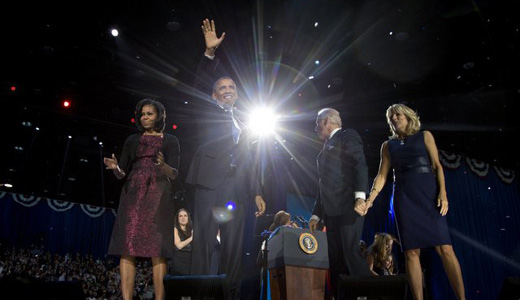
WASHINGTON – First there was anticipation, touched with a little bit of angst. Then there was exhilaration, as the electoral vote totals mounted for Democratic President Barack Obama mounted and as pro-worker U.S. Senate candidates won.
And then, just after 11:15 p.m. Eastern Time, there was glee.
Those were the stages of emotion as a crowd packed the AFL-CIO headquarters’ big main floor meeting room on Election Night, Nov. 6, watching the returns come in from around the U.S. The same emotions, no doubt, existed at union halls and in countless other locations nationwide.
Would Obama, labor’s favored candidate, win a second term against anti-worker GOP nominee Mitt Romney, a jobs-exporting venture capitalist with an explicit program to destroy unions? Would pro-worker Democrats retain control of the U.S. Senate?
And would all of labor’s work – work that included a phone bank to swing states that extended from Sept. 17 until 10 p.m. on Election Night – pay off?
Those were questions only the U.S. electorate would answer.
The first clue came around 9 p.m. Romney had made a late push to grab Pennsylvania. Its 20 electoral votes were vital to Obama achieving a majority of 270 or more in the 538-vote Electoral College. Courts had thrown out the GOP’s tough “voter ID” law in the Quaker State, but there were still reports coming in of Republican voter suppression efforts through demands for identification at the polls.
And then the networks called Pennsylvania for Obama. A cheer went up – mixed with sighs of relief.
Minutes passed. Another cheer rose when the first true swing state, New Hampshire (4 electoral votes) toppled into Obama’s column. Some people, monitoring state-by-state congressional returns on computers around the room, or on their own hand-held devices, noted two Democratic pro-worker female congressional candidates had ousted two incumbent Republican U.S. representatives there, too.
That gave the Granite State the first all-woman congressional delegation in U.S. history. Its senators, one from each party, are women. So is its new governor, a Democrat. Her party affiliation is important to workers: Retiring Gov. John Lynch (D) had vetoed an anti-worker “right-to-work” law passed by the GOP-run legislature.
Those implications were interrupted by a bigger cheer: Democrat Elizabeth Warren had unseated 2-year GOP Sen. Scott Brown in Massachusetts. The Warren-Brown race was so vital to labor’s chances of holding the U.S. Senate against the anti-worker GOP that the AFL-CIO listed Massachusetts as one of its top eight states. With Obama easily carrying the deep blue Bay State, it was the sole non-presidential one on that list. Teddy Kennedy’s old seat was back in a pro-worker Democrat’s hands.
The evening wore on and other swing states swung Obama. The margins were narrow, but they were there: Michigan, Wisconsin. Cheers erupted when the GOPer in another tight Senate race, George Allen, conceded to Democrat Tim Kaine in Virginia. A lot of the crowd had walked precincts in Virginia for weeks. And then another cheer: Ardently pro-worker Democrat Sherrod Brown won Senate re-election in Ohio.
Scattered boos arose when expected red states in the Deep South and the Great Plains – the Dakotas, Kansas, Nebraska, Oklahoma, Wyoming, Texas, South Carolina, Georgia, Alabama, Mississippi, Louisiana, Arkansas – went for Romney. Silence greeted Romney’s win in Missouri, and cheers greeted Democratic Sen. Claire McCaskill’s victory there.
People watched the big TV screens and did mathematical calculations. But all the number-crunching came down to one conclusion: Obama wins re-election with one more smaller swing state – New Mexico filled the bill – and, of course, Ohio.
And then, around 11:15 Eastern Time, the networks and wire services called it: Obama wins Ohio. With the entire West Coast added in the minutes before – a foregone conclusion – the president had 274 electoral votes.
Rock music blasted from the speakers, or maybe the TV screens showing the packed flag-waving auditorium at Obama headquarters in Chicago. At the AFL-CIO, people hugged, slapped hands, gave each other high fives. But no victory cigars: Smoking is forbidden inside the AFL-CIO building.
At first, Romney refused to concede the election. He claimed there were too many votes still uncounted in Ohio and Obama’s margin was too slim. That didn’t faze the crowd. Those who looked at the TV screens ignored him. All those weeks of effort by the AFL-CIO and Working America had paid off. An hour later, he threw in the towel.
And those who looked at detailed returns coming in on computers knew Romney was right – and wrong. Yes, they told others, many Ohio votes are out as of 11:30. But they were in Cleveland, an Obama and Democratic stronghold. With only one-third of the Cuyahoga County precincts reporting, Obama had a 120,000-vote lead there. Ohio was safe – and the glee could continue. Workers would have an ally, not an enemy, in the White House.
Photo: President Obama, family, and the Bidens before his victory speech AP












Comments